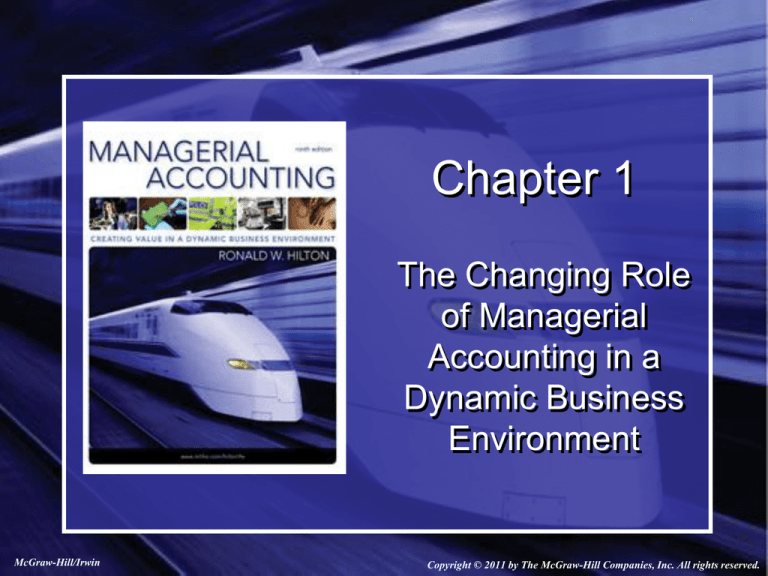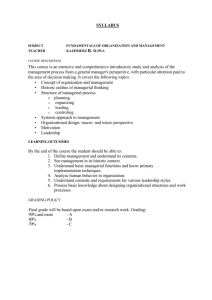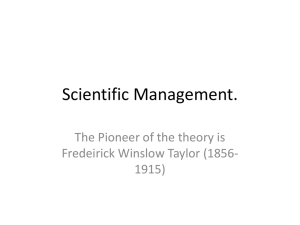
Chapter 1
The Changing Role
of Managerial
Accounting in a
Dynamic Business
Environment
McGraw-Hill/Irwin
Copyright © 2011 by The McGraw-Hill Companies, Inc. All rights reserved.
Define Managerial Accounting
Managerial accounting is the process of
Identifying
Measuring
Analyzing
Interpreting
Communicating information
1-2
Managing Resources, Activities,
and People
An organization . . .
Directing
Acquires Resources
Decision
Making
Organized set
of activities
Controlling
Planning
Hires People
1-3
How Managerial Accounting Adds
Value to the Organization
• Providing information for decision making and
planning.
• Assisting managers in directing and controlling
activities.
• Motivating managers and other employees
towards organization’s goals.
• Measuring performance of activities, managers,
and other employees.
• Assessing the organization’s competitive position.
1-4
Managerial versus Financial
Accounting
Managerial Accounting
Users of Information Managers, within the organization.
Regulation Not required and unregulated, since it is intended
only for management.
Financial Accounting
Interested parties, outside the organization.
Required and must conform to generally accepted
accounting principles. Regulated by the Financial
Accounting Standards Board, and, to a lesser
degree, the Securities and Exchange
Commission.
Source of Data The organization's basic accounting system, plus Almost exclusively drawn from the organization's
various other sources, such as rates of effective basic accounting system, which accumulates
products manufactured, physical quantities of
financial information.
material and labor used in production, occupancy
rates in hotels and hospitals, and average take-off
delays in airlines.
Nature of Reports and Reports often focus on subunits within the
Reports focus on the enterprise in its entirety.
Procedures organization, such as departments, divisions,
Based almost exclusively on historical transaction
geographical regions, or product lines. Based on a data.
combination of historical data, estimates, and
projections of future events.
1-5
Line and Staff Positions
• A line position is directly
involved in achieving the
basic objectives of an
organization.
– Example: A production
supervisor in a
manufacturing plant.
• A staff position supports
and assists line positions.
– Example: A cost
accountant in the
manufacturing plant.
1-6
Controller
The chief managerial and financial accountant
responsibility for:
– Supervising accounting personnel
– Preparation of information and reports, managerial
and financial
– Analysis of accounting information
– Planning and decision making
1-7
Treasurer
Responsible for raising capital and safeguarding the
organization’s assets.
– Supervises relationships with financial institutions.
– Work with investors and potential
investors.
– Manages investments.
– Establishes credit policies.
– Manages insurance coverage
1-8
Internal Auditor
Responsible for reviewing accounting procedures,
records, and reports in both the controller’s and the
treasurer’s area of responsibility.
– Expresses an opinion to top
management regarding the
effectiveness of the
organizations accounting
system.
1-9
Major Themes in Managerial
Accounting
Behavioral
Issues
Costs and
Benefits
Information
and Incentives
Evolution and
Adaptation
Managerial
Accounting
1-10
Cost Management Systems
Objectives
Measure the cost of resources
consumed.
Identify and eliminate nonvalue-added costs.
Determine efficiency and
effectiveness of major
activities.
Identify and evaluate new
activities that can improve
performance.
Cost
Management
System
1-11
Strategic Cost Management and
the Value Chain
Product
Design
Production
Research
and
Development
Securing raw
materials and
other resources
Start
Marketing
Distribution
Customer
Service
1-12
Ethical Climate of Business
The corporate scandals experienced over the last
few years have shown us that unethical behavior
in business is wrong in a moral sense and can be
disastrous in the economy. In addition to
Sarbanes-Oxley, there will likely be more reforms
in corporate governance and accounting.
1-13
Managerial Accounting as a
Career
Professional Organizations
Institute of Management Accountants (IMA)
Publishes
Management
Accounting
and research
studies.
Administers
Certified
Management
Accountant
program
Develops
Standards of
Ethical
Conduct for
Management
Accountants
1-14
Professional Ethics
Competence
Confidentiality
Integrity
Credibility
1-15






